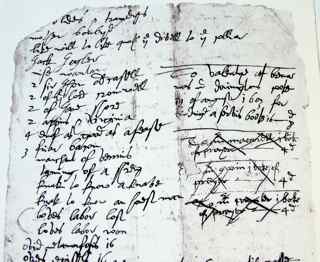Love's Labour's Won
Historical Records
1598, Palladis Tamia:
In 1598 Francis Meres, a cleric and schoolmaster, published a lengthy essay entitled Pallidas Tamia, Wits Treasury in which he praised contemporary English poets by comparing them favorably to their classical counterparts. He wrote the following paragraph about Shakespeare:
As Plautus and Seneca are accounted the best for comedy and Tragedy among the Latines: so Shakespeare among ye English is the most excellent in both kinds for the stage; for Comedy, witnes his Ge[n]tleme[n] of Verona, his Errors, his Loue labors lost, his Loue labours wonne, his Midsummers night dreame, & his Merchant of Venice: for Tragedy his Richard the 2. Richard the 3. Henry the 4. King Iohn, Titus Andronicus and his Romeo and Iuliet.
1603, Packing slip, Christopher Hunt:
A bookseller named Christopher Hunt moved to Exeter in 1603 when he finished his apprenticeship in London. He had books shipped to him at his new location. A leaf of manuscript—apparently a packing slip—dated 19 August 1603 on the verso (9 August on the recto) was discovered in 1953 by a London bookseller and antiquarian named Pottesman as part of the binding of a collection of sermons printed in 1637 (Certaine Sermons). Pottesman showed the leaf of manuscript to American scholar T. W. Baldwin as he was leaving the British Museum (now Library) on the evening of 31 December 1953. Baldwin subsequently researched the provenance of the manuscript and determined that it represented property of Christopher Hunt. Baldwin published his findings in Shakspere's Love's Labor's Won in 1957.
Upper half of the Hunt packing slip:
Theatrical Provenance
A reasonable assumption, based on Shakespeare's authorship, is that Love's Labour's Won belonged to the Chamberlain's Men. The date of acquisition, sometime between 1594 and 1598, is predicated on the assumption that Shakespeare wrote the play as a sequel to Love's Labour's Lost.
Probable Genre(s)
Comedy (Harbage)
Possible Narrative and Dramatic Sources or Analogues
A reasonable assumption is that Shakespeare's Love's Labour's Lost is a narrative and dramatic source for Love's Labour's Won. The most logical guess at a story is the courtships suspended at the close of Love's Labour's Lost, but there are examples of play titles that advertise themselves as sequels yet do not carry over either characters or story lines from their apparent first part: for example, A Knack to Know an Honest Man (apparent sequel to A Knack to Know a Knave) and Every Man out of his Humour (apparent sequel to Every Man in his Humour).
References to the Play
Francis Meres, Palladis Tamia, Wits Treasury (Oo3)
Critical Commentary
For What It's Worth
<Enter any miscellaneous points that may be relevant, but don't fit into the above categories. This is the best place for highly conjectural thoughts.>
Works Cited
<List all texts cited throughout the entry, except those staple texts whose full bibliographical details have been provided in the masterlist of Works Cited found on the sidebar menu.>
<If you haven't done so already, also add here any key words that will help categorise this play. Use the following format, repeating as necessary:>
Site created and maintained by your name, affiliation; updated DD Month YYYY.
